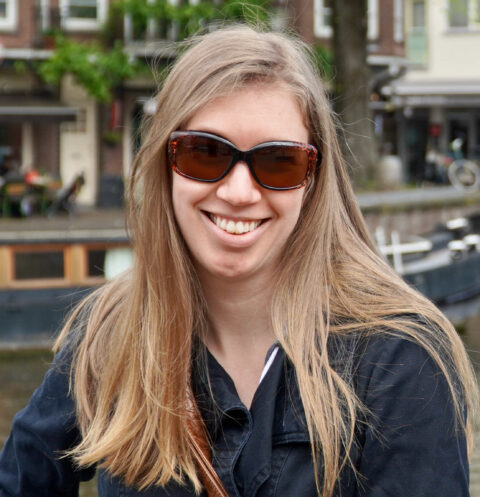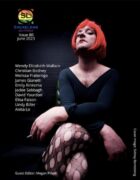This story feels very contemporary, even if the PogoFlyer device in the opening has not been invented yet (and perhaps should not ever go into production). How were you thinking about locating the era of time in this flash?
I’m fascinated by slightly altered timelines — worlds that are completely ours except for one small difference or tweak. As a (slightly) aging Millennial, it wasn’t a far stretch for me to imagine this superpowered pogo stick into the splashy neon intensity of the mid-nineties. I could easily see jean-jacketed, side-ponytailed kids hopping while singing the Reading Rainbow theme. In fact, while revising, I found myself humming the first two lines: “Butterfly in the sky, I can go twice as high.” All of this to say, the present action of this story takes place in a close parallel to our present.
The description of the first time the speaker and their partner have sex is really tender and contrasts the danger of the PogoFlyer. It’s a very compelling juxtaposition, but also tracks with the idea of safety regarding partnership—and they’ve bought a home together. How were you thinking about safety and danger when writing these characters?
I think any time a relationship takes a step forward, it creates a strange cocktail of increased security and increased fear. You’ve committed this much further to each other, which feels incredible, but you also have this much more to lose. The girlfriend here embodies what could be described as both wife and life goals. The narrator admires the way her girlfriend charges through the world headlong, is intoxicated by it, tries to enact some of this herself instead of curling inward into knee-hugging anticipation of the worst. The narrator is the girl who always had Band-Aids in her school backpack, who never stopped wearing her retainers (and brushed them every night), who only had two beers at the college parties because someone needed to rub Justine’s back while she threw up into the bushes. Also, she never told Justine how she wanted to do so much more than rub her back and was terrified that Justine would somehow sense it and everything would break. The narrator can feel it in her perfectly straight teeth, that disaster is always lurking. Even in the delicious surrender her girlfriend offers her, she can’t help but glance over her shoulder, waiting.
I really want to know how you conceptualized the PogoFlyer. Can you share where it came from?
The idea originated from a prompt in one of Tommy Dean’s flash workshops, which was, by the way, fabulous. I wish I could remember the exact wording, but we were asked to re-conceptualize a childhood toy and to think about how it could be a point of tension in the piece. I never had a pogo stick as a kid and was of course terribly jealous of anyone who did, so this seemed like an obvious choice for the center of a story. But wanting a toy that you can’t have didn’t seem all that interesting — far more interesting to want to want something. I had also just gone down a bit of an internet rabbit hole about the training necessary to become an astronaut, and had watched a number of videos about simulating microgravity to prepare people for conditions on the International Space Station. This must have been where the ultra-bounce idea (forgive me) sprang from.
You’ve published your writing widely in many different forms. What do you like about flash fiction?
Oh boy, flash fiction is my absolute favorite form to write in. It allows me to take a concept, hold it up to a window to catch some light, turn it over, and put it down again. I usually write flash pieces in one sitting, letting it all come out in a whoosh, and there’s something so satisfying about having a whole thing done. Well, not done, because it always needs a lot of shaping, revising, and agonizing afterwards, but I can see my way through the entirety of it while I work at it. While I love the short story form too, it feels more unwieldy and wriggly with moving parts that keep trying to whack me in the head. I have always considered myself married to fiction, genre-wise, but I took a poetry workshop with Marianne Boruch while getting my MFA at Purdue. She told me, about halfway through, that I thought and wrote like a poet. This was at a point in which I was struggling to produce a single draft for my short story workshop while slinging poems out two at a time, so I became concerned I had gotten it wrong all along. And then I read my first flash fiction piece. It felt to me, then, like the perfect marriage between the two types of writing I was attempting, a way to harness my love of narrative into a delightfully bite-sized container. Crisis averted.



 The core workshop of SmokeLong Fitness is all in writing, so you can take part from anywhere at anytime. We are excited about creating a supportive, consistent and structured environment for flash writers to work on their craft in a community. We are thrilled and proud to say that our workshop participants have won, placed, or been listed in every major flash competition. Community works.
The core workshop of SmokeLong Fitness is all in writing, so you can take part from anywhere at anytime. We are excited about creating a supportive, consistent and structured environment for flash writers to work on their craft in a community. We are thrilled and proud to say that our workshop participants have won, placed, or been listed in every major flash competition. Community works.